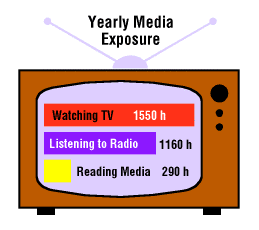
Why Influence?
Everyday
Modern
Definitions
# of Tactics?
16 Tactics
53 Tactics
Ethics I
Ethics II
Disciplines
Approach
Bad Info
Structure
Mindfulness
Mindlessness
Matrix
Bibliography
Classwork
Links
Persuasion is everywhere.
I once tried to count the number of direct attempts to control
my thoughts and behavior I encountered in a single day. This
included people requesting me to do things, forcing me to do
things, asking me to buy things, telling me to pay for things,
showing me where to stop and when to go, suggesting how I should
think about things, offering me slogans to repeat, songs to remember,
attitudes to change, and ideologies to believe. I avoided the
morning newspaper and radio program, because I knew I couldn't
count that fast. By the time I reached my office at mid-morning,
I lost count somewhere around 500.
We live in an environment dense with influence attempts. A large
portion of the population makes a living simply getting others
to comply with their requests. Conservative estimates suggest
that a person will receive up to 400 persuasive appeals from
marketers alone in the course of a single day. Whether a
manager encouraging productivity, a policeman directing traffic,
a salesperson closing a sale, or a president telling us we need
to spend more money on social programs-- each of us is subjected
to an uncountable number of influence attempts each day.
 Don't believe
me yet? OK, let's focus on just the mass media, a major contender
for your attention, time, and most profitably, your inevitable
compliance. Each year, the average American spends 1550 hours
of TV, listens to 1160 hours of radio, and spends 290 hours reading
newspapers and magazines. If you watch the normal amount of TV,
each day you'll have seen 100 TV ads.
Don't believe
me yet? OK, let's focus on just the mass media, a major contender
for your attention, time, and most profitably, your inevitable
compliance. Each year, the average American spends 1550 hours
of TV, listens to 1160 hours of radio, and spends 290 hours reading
newspapers and magazines. If you watch the normal amount of TV,
each day you'll have seen 100 TV ads.
If your job were to simply do the average amount of watching, listening, and reading of the mass media, you'd be at it 8 hours a day, 7 days a week, 375 days a year! (No, that's not a misprint--you couldn't get it done in a year at this pace. You'd have to work overtime.)
And that doesn't even include the time you spend interfacing
with people at work. It has been estimated, for instance, that
general managers spend upward of 80% of their time in verbal
communication--most of it attempting to cajole or persuade fellow
employees. Don't forget your spouse, your children, your neighbors,
strangers, and countless others you meet in the course of an
average day-- all of whom want you to do something and are going
to try to get you to do it. (Do you feel exhausted?)
 From my vantage point, society
is a massive group of people influencing, persuading, requesting,
demanding, cajoling, exhorting, inveigling, and otherwise manipulating
each other to further their ends.
From my vantage point, society
is a massive group of people influencing, persuading, requesting,
demanding, cajoling, exhorting, inveigling, and otherwise manipulating
each other to further their ends.
We call it society because we persuade instead of physically coerce. Imagine if each influence attempt were replaced with coercion--the store owner whacking you across the knees if you didn't purchase that shirt, your boss punching you in the stomach to make you work harder, the policeman simply shooting you in the back for doing 45 mph in a 35 mph zone. After the typical day, you'd be a physical wreck. Persuasion, on the other hand, makes society work smoothly--while physical coercion grinds it to a halt. Successful persuasion makes physical coercion unnecessary--interpersonally and internationally. Thus society benefits from persuasion.
And those who know how to persuade, benefit the most from
society.
So how do people master modern persuasion?
. . .
All rights reserved.
www.workingpsychology.com
